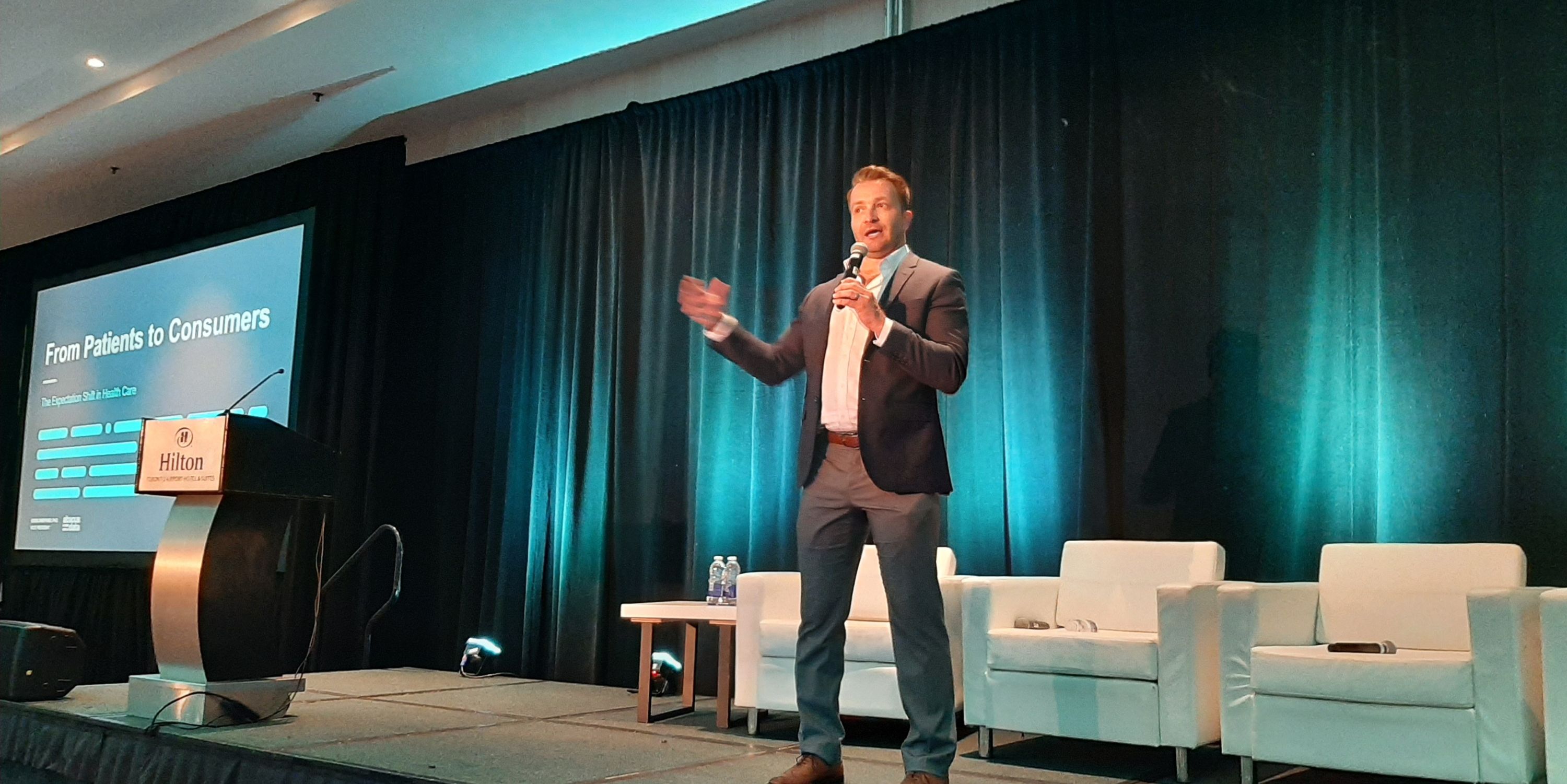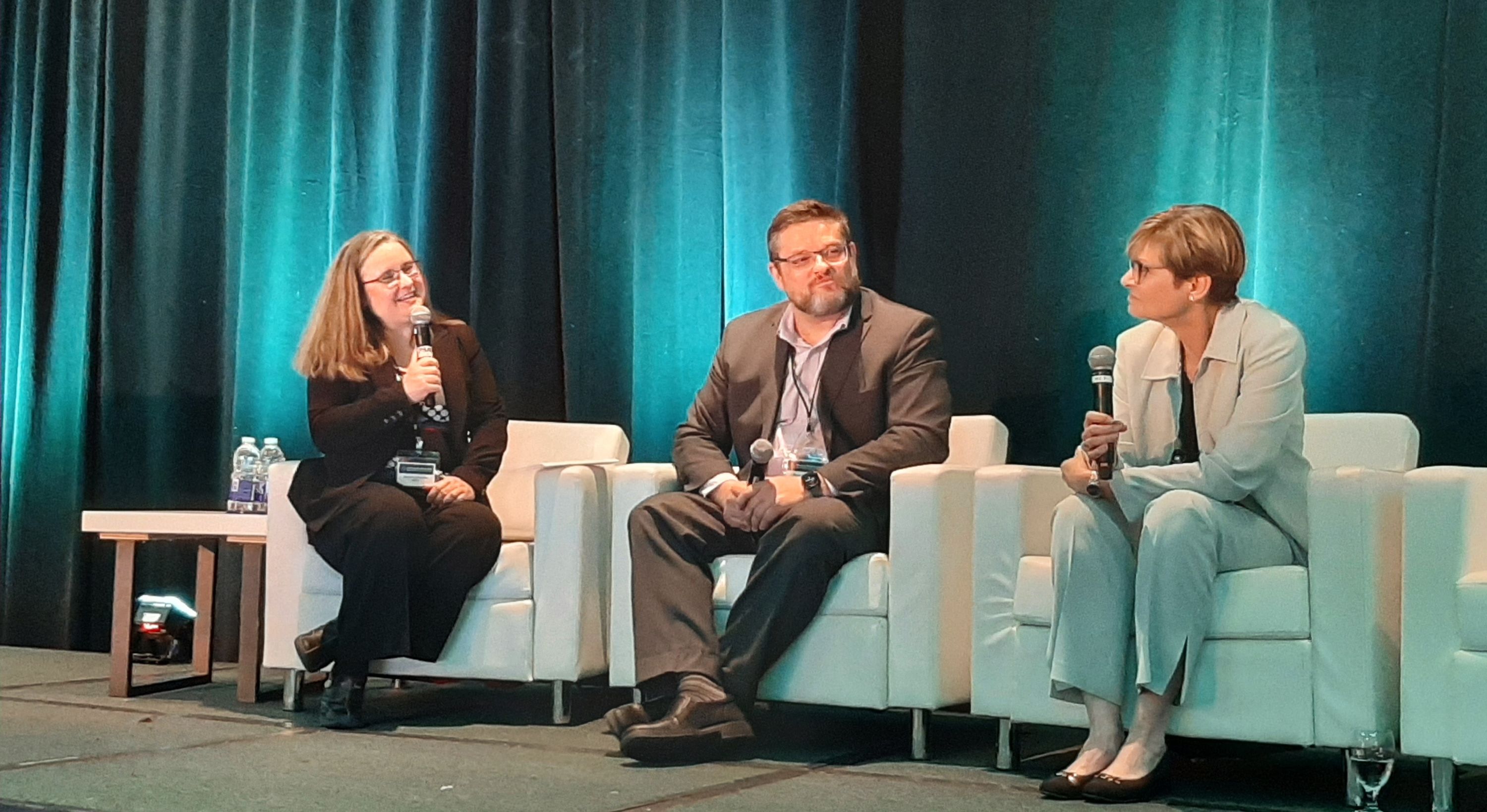Navigating disruption: CPhA hosts national pharmacy leadership summit
With pharmacy facing transformative shifts in technology, patient expectations, and health policy, the Canadian Pharmacists Association (CPhA) hosted a national leadership summit on June 4, 2025, to chart the path forward. Pharmacy Disruptors 2030 convened pharmacy leaders, innovators, regulators, and health professionals for timely conversations on the forces reshaping Canadian health care—and the critical role pharmacy must play in leading that change.
From artificial intelligence (AI) to consumer-driven care and pharmacy benefit manager (PBM) reform, the Summit’s program tackled pharmacy’s most urgent disruptors through keynotes and panel discussions focused on the challenges and opportunities shaping the next five years.
Opening with vision: The profession steps up
In her opening remarks, CPhA Board Chair Annette Robinson welcomed attendees by affirming the profession’s responsibility to lead disruption, not simply respond to it. She highlighted key advocacy milestones, including CPhA’s Competition Bureau complaint against Express Scripts Canada, and announced the launch of the National Pharmacy Business Council to bring a stronger economic voice to national pharmacy strategy.
“Our job at CPhA,” she said, “is to bring the pharmacy community together to understand what’s coming—and how we respond, together.”

CPhA CEO Glen Doucet discusses AI and lessons learned across other industries with Nick Neuheimer (Canadian Association of Radiologists), Jeff Nagge (University of Waterloo), Joshua Liu (Seamless MD) and Colin Lachance (LawQi).
AI: Promise, pragmatism, and public trust
AI featured prominently across the day’s discussions, from workforce transformation to real-time clinical decision support. Leaders from MedMe Health, MedEssist, and PharmaGuide shared innovations aimed at freeing up pharmacists’ time and improving care—but speakers also urged caution against unchecked tech optimism.
The consensus? AI will never replace clinical judgment. Its power lies in enhancing time-saving, low-risk, high-burden tasks to support clinicians—not supplant them.

Rexall’s Heidi Wittke moderates a discussion on integrating AI into pharmacy workflows with Nick Hui (MedMe Health), Faddy Morgan (PharmaGuide) and Michael Do (MedEssist).
A key takeaway from multiple sessions was the need for a national AI health infrastructure to ensure integration is safe, ethical, and effective. As AI becomes more visible in care delivery, building public trust is essential. This will require transparent communication, meaningful engagement, and a patient-first mindset.
Patient to consumer: Pharmacy’s new frontier
Canadians are no longer just patients—they are health consumers. This theme came to life in polling data presented by Abacus Data’s Eddie Sheppard, revealing a growing demand for speed, personalization, digital access, and human connection in care.

Eddie Sheppard (Abacus Data) presents new public opinion research on how shifting consumer attitudes are transforming expectations in health care.
According to Sheppard, 55% use digital tools to manage their health, and nearly half are likely to use online pharmacies in the future. Younger Canadians are leading this shift, with 47% of those aged 18–44 trusting AI for health information, compared to just 23% of those 60 and older.
Still, confidence in digital tools depends on human oversight:
- 29% want access to a real person for questions
- 28% prefer licensed professionals to oversee AI content
- 22% value tools from trusted platforms
In a session featuring PocketPills, McKesson, and Jones Healthcare Group, panelists discussed how pharmacy must adapt through “click-and-collect models”, virtual communication, and digital-first strategies—all without compromising pharmacist-patient relationships. Health consumers want fast, personalized, on-demand care, digital flexibility, and authentic human connection. Pharmacy is well positioned to deliver on this new model—but only if technology is used to augment, not replace, the pharmacist’s expertise and empathy.

Christy Cheung moderates a conversation on the evolving patient journey with James Lee (Jones Healthcare Group), Uchenwa Genus (McKesson) and Raj Gulia (PocketPills).
Oversight and opportunity: Regulators lean in
Regulators from Ontario and Alberta explored how oversight must evolve to match the pace of automation and AI, highlighting how automation can be seen as a tool for improving patient safety, not just cost savings. Others emphasized how virtual care could expand access for underserved communities, provided it’s implemented thoughtfully.

Geneviève Pelletier (Association québécoise des pharmaciens propriétaires) discusses regulatory perspectives on automation, AI, and virtual care with Monty Stanowich (Alberta College of Pharmacy) and Susan James (Ontario College of Pharmacists).
PBMs: A wake-up call for Canada
The final session of the day, The PBM Wake-Up Call, featured Antonio Ciaccia of 3Axis Advisors alongside Bruce Winston of Neighbourly Pharmacy and Joelle Walker of CPhA. Ciaccia delivered a powerful critique of the U.S. PBM model, where 80% of prescriptions flow through PBMs based on “fake prices” and opaque rebate schemes. “PMBs are three times more profitable than most comparable sized business in the US,” he noted.
CPhA’s Joelle Walker updated attendees on CPhA’s complaint against Express Scripts Canada, highlighting the formal investigation by the Competition Bureau as a significant milestone in CPhA’s ongoing efforts to combat anti-competitive practices in the third-party payer space and defend the interests of pharmacists and patients across the country.
Celebrating disruption and leadership
The event also highlighted the Summit contest winners, pharmacist Sayeh Radpay of HumanisRx, and Maya Abdul Majed, student leader of HackRx, a student pharmacy-based hackathaon. Both were recognized for their creative, future-focused approaches to pharmacy care.
- Related: Hear what our Win a Trip to the Summit contest winners had to say about their experiences.
A call to action
Closing the day, Annette Robinson reminded attendees: “We’ve explored big ideas and challenged assumptions. But our work doesn’t end here. The conversations we started today must continue—and drive the change our profession needs.”
CPhA thanks the Summit sponsors for helping make the Pharmacy Disruptors 2030 Summit possible, and to all our attendees, speakers and panellists for driving such powerful, future-focused discussions.

